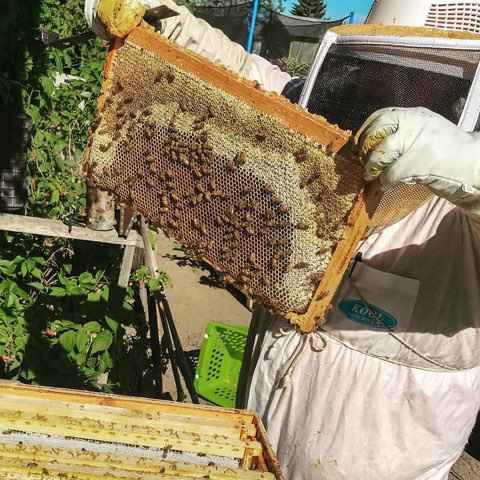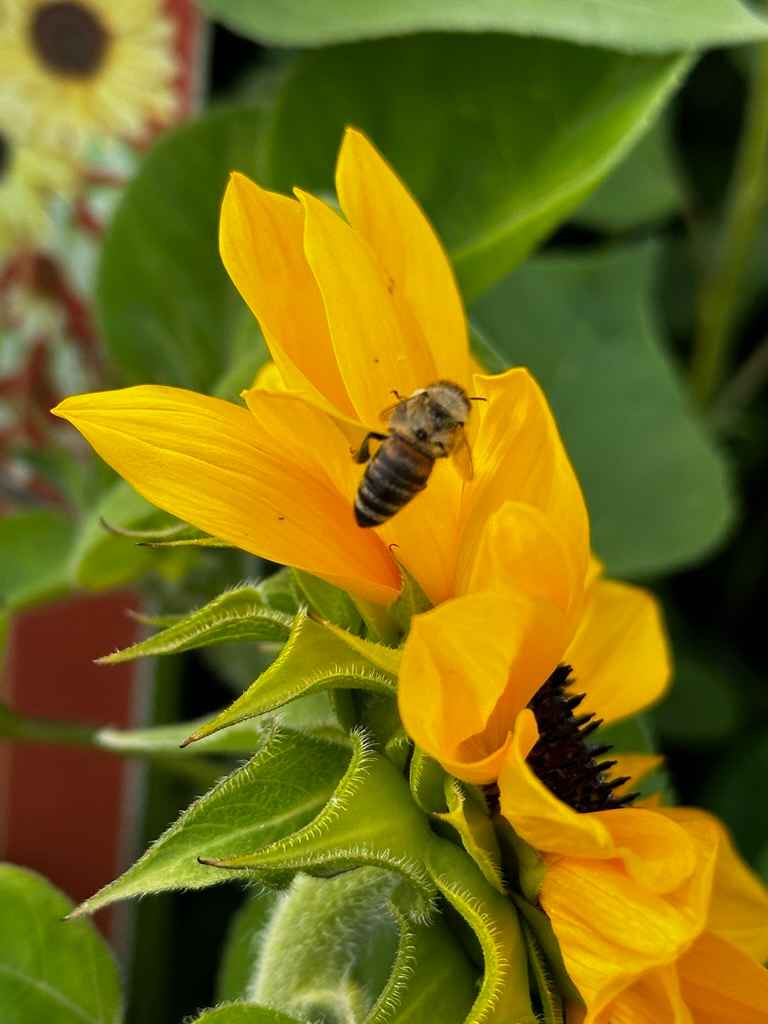Local Beekeeper explains how climate change is affecting beekeeping in Kamloops and surrounding areas, as well as what citizens can do to help save the bees.
“Over the last 75 years, bee populations have decreased over 50%, while human populations have increased by over 130%. Bees are responsible for commercial food production that powers modern cities and the world” (Save The Bees, n.d.). Climate change has not helped with this either as the constantly changing climate, bees are no longer following their normal routine.
Oliver Taylor, a second generation beekeeper, and his wife Beth Taylor explained how climate change is affecting beekeeping as well as what it’s doing to bees.
Oliver is a hobby beekeeper (as pictured to the right), which focuses on beekeeping as a passion instead of for a profit. Most hobby beekeepers, like Oliver, work with honey bees instead of bumble bees, mason bees or solitary bees as honey bees are the easiest to obtain and work well in larger groups.
Oliver started off by talking about how the climate has been affecting bees and beekeeping. “Either last winter or the winter before, it was really warm all the way into December, so what happened was bees didn’t cluster. So they were still spaced out within the hive and the queen’s still producing eggs and then it suddenly got cold.” he stated.
“They used up their winter supply in the first two weeks, leaving nothing to keep them alive or warm, leading to the death of the hive.,” Beth adds.
“That’s one thing with climate change. The other one would be super hot summers, and the smoke too since they don’t like smoke. Because they need super specific conditions to fly in, smoke seems to trigger them not to want to fly to go collect pollen Which then leads to low baby production, which then leads to the death of the hive.”

Oliver said due to recent wildfires, many bees have left the area in search of safer environments.. “Most of the valley bottom bees would’ve gone higher to get out of the smoke.”
“As a beekeeper, you’re reliant on the weather, but you also have to be kind of a fortune teller to figure out, ‘yeah it’s warm right now but are we going to get a frost?’” Beth adds.
Oliver says, “beekeeping, like any kind of agricultural thing, is not looking at today. Today you’re working. But what you do today affects you six months from now.”
With the save the bees campaign, we asked how they view the save the bees campaign and how it has affected his life as a beekeeper.
Oliver said at a farmers market he was told thank you, which he was confused by as he feels he has nothing to do with saving the bees.
“It’s not the happy go lucky of like ‘Oh, Save the Bees!’ Like beekeepers have so little to do with saving the bees. It’s much more that they are farmers” Beth says.
“But that’s where save the bees come into it. It’s not honey bees but local solitary bees or small group bees can weather these things better than managed hives can.” Oliver adds.

Oliver began talking about a study done in Japan where “they don’t have a ton of managed honey bees but they have some. Orchardists were supplementing by raising their own Mason bees and Solitary bees and they were finding that when they brought in the honey bees to pollinate most of the flowers were already pollinated because the Mason bees and the Solitary bees work at a cooler temperature than the honey bees.”
“They actually found it was more cost effective for the orchardist to raise their own honey bees because they operate better, work in cooler air, can go in wet air and they aren’t susceptible to some diseases within the honey bee population.”
“So like, save the bees vs like for beekeepers, saving the bees is like keeping beekeepers out of it essentially.”
Beth and Oliver say ways that people can help save the bees would be to watch what pesticides you use on your lawn or avoid it. Rake your leaves less as bees will use those for water and sources of heat during the winter seasons. You can even leave a plate of water with rocks so they can hydrate. Bees need to stand to drink so if they don’t have a shallow pool of water, they will drown.
You can also go to savethebees.com to search more ways to help save the bees.
Kamloops is a Bee City, which means they have special laws put in place for residents to own and have bees on their property. Learn more at www.kamloopsbeekeepers.com.
Beth says that the Kamloops beekeeper society will let local beekeepers know of any possible disease outbreaks in Kamloops. They also help with testing of it and being able to bring in your bees and test them for you to see if there were any outbreaks in your bee colony.
Sources:
Home. Kamloops Beekeepers. (2024, February 2). http://www.kamloopsbeekeepers.com/
Orchard pollination: Solitary (mason) bees. Penn State Extension. https://extension.psu.edu/orchard-pollination-solitary-mason-bees
Save The Bees – Supporting Beekeeping and Research. (n.d.). Save the Bees. https://savethebees.com/Biddinger, D. (n.d.).
You don’t need to say “With the save the bees campaign, we asked how they view the save the bees campaign and how it has affected his life as a beekeeper.”
You can say: They support the Save the Bees campaign because “xxxxx {here a quote from them.} xxxxx”